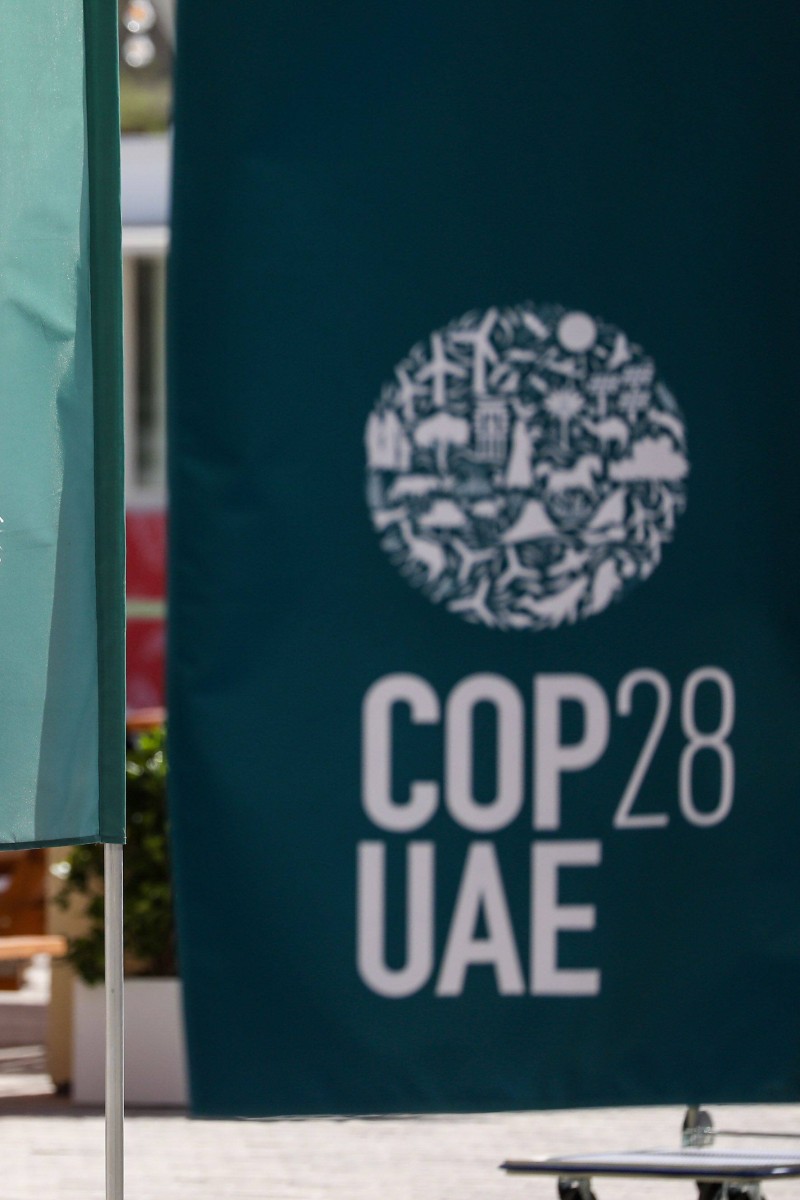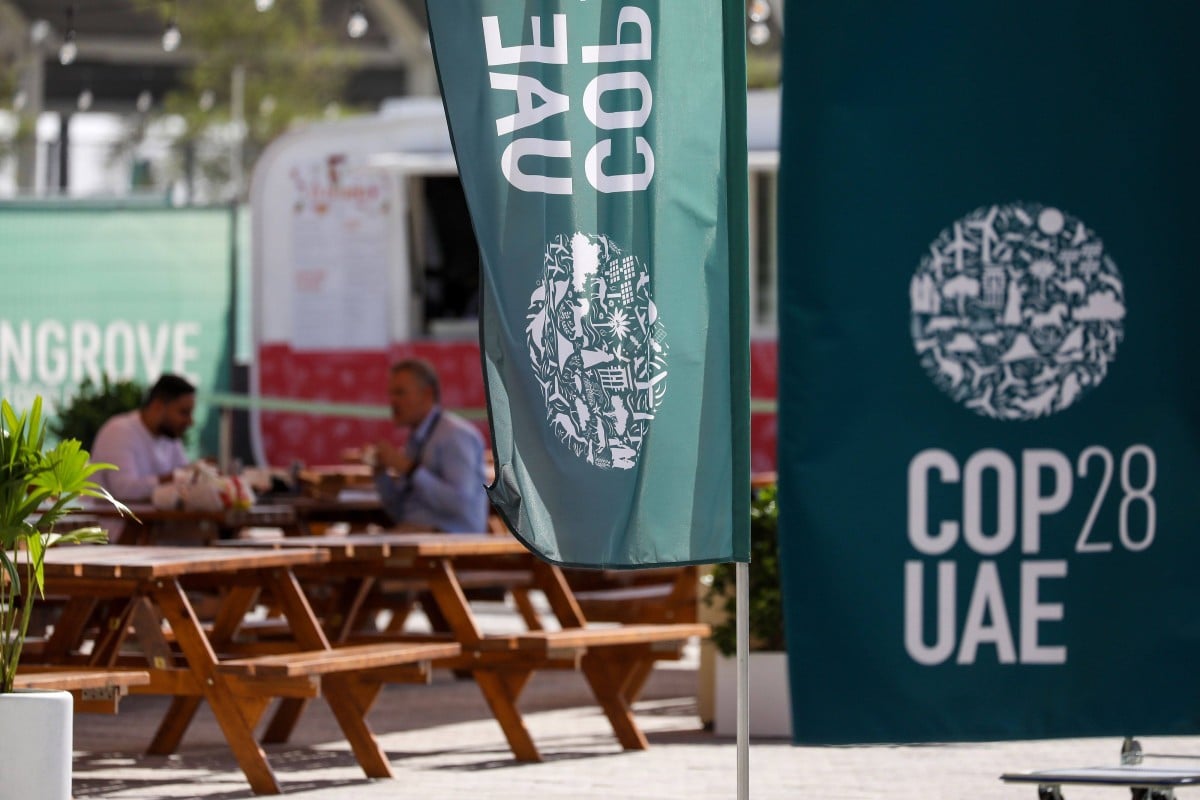
Gaza’s environment, devastated by war, catches the attention of activists at the Cop28 summit
- Israel’s assaults have destroyed agricultural lands, scorched olive trees that have stood for generations and contaminated dwindling water resources
- Experts warn the situation could ‘become an environmental catastrophe’ and say world’s wars are using up much needed climate cash
 COP28 summit discussions centred around the environmental impact of war in Gaza. Photo: Bloomberg
COP28 summit discussions centred around the environmental impact of war in Gaza. Photo: BloombergWorld leaders and activists gathered in Dubai last week at Cop28 UAE – the United Nations climate change conference. Discussions were centred around saving Earth, but another environmental crisis is looming, and it raised concerns among participants at the summit.
Devastated by a nearly two-month-long assault by Israeli air strikes and ground fighting, large swathes of Gaza have been flattened, agricultural lands have been destroyed, olive trees that have stood for generations are scorched and dwindling water resources are contaminated.
Experts warn that white phosphorus – a chemical illegal under international law that a human rights group says is in used in Israeli operations – could also be detrimental to the environment, including the air and soil. Palestinians are worried that the land could take years to recover, and activists at the summit are tying the plight of Gazans to climate justice globally.
The Secretary General of the International Federation of Red Cross and Red Crescent Societies Jagan Chapagain warned during the summit that Gaza could “become an environmental catastrophe”.
But with the destruction of much of Gaza’s infrastructure and an exceptionally heavy human cost – over 15,000 Palestinians, mostly women and children, have been killed there since October – it’s impossible for the country to give climate and environment the attention it needs, said Hadeel Ikhmais, a climate change expert with the Palestinian Authority, at the summit’s first-ever State of Palestine Pavilion.
“We have policies, we have indices, we have … a lot of strategies and plans, well developed. But now we have to rethink all of what we’ve been working for the last 10 years because what happened in Gaza destroyed everything,” she said. “We have to build the city all over again.”
Your Voice: Innocent suffer in war in Gaza Strip (long letters)
She asked: “What kind of climate justice are we talking about while all the people in Palestine are endangered and their lives are lost?”
Gaza’s water has long been scarce – but the war has made it even more acute. Israel cut off water pipelines and electricity, meaning desalination plants couldn’t run, leading to a host of health and sanitation concerns for residents. Agriculture in Gaza, mainly olive trees and citrus fruits as well as other plants, has been decimated because of water shortages and the devastation of the land.
White phosphorus, that human rights groups say was used in densely populated areas, is illegal under international law when used on civilians. It can set buildings on fire and burn human flesh. It poses health risks for survivors and can get deep into soil and water.
War also raises climate concerns: militaries worldwide are responsible for 5.5 per cent of all greenhouse gas emissions, according to the Conflict and Environment Observatory and Scientists for Global Responsibility, and militaries are under no obligation to report or reduce their carbon footprint.
Climate activists, who largely support calls for a ceasefire and justice for Palestinians, have centred the issue in protests at the United Nations talks. They say that climate justice – the idea that saving Earth from hotter temperatures is linked to a more just world for everyone, especially the most vulnerable – is inextricably linked with security and freedom for Palestinians living under Israeli occupation because both crises are fuelled by colonisation and capitalism.
“The Palestinian struggle is a struggle for self-determination and climate justice is a struggle for self-determination,” said Katherine Robinson, a climate campaigner from South Africa. “There is no climate justice in occupied territories. There’s no climate justice during war and there’s no climate justice during apartheid.”
Climate anxiety is more common than you think. These US students want to help
Rania Harara, from the Middle East and North Africa feminist task force, agreed that climate justice goes hand in hand with Palestinian solidarity.
“We cannot sit here and talk about climate justice without talking about human rights,” she said.
The war on Gaza is also affecting how much funding can be diverted to climate initiatives, said Mohamed Adow, the director of Power Shift Africa, a Nairobi-based climate and energy think-tank.
Adow says wars and conflict are using up much needed climate cash that could have otherwise been very useful to help protect vulnerable communities from climate disaster. He used the example of Ukraine, where he says trillions of dollars were sent at a time that the international community was struggling to mobilise a hundred billion for climate finance.
“Demilitarisation across the world must be a key component of climate justice,” Adow said.
The Israeli Foreign Ministry’s top diplomat for the Mideast, Oded Joseph, said Israel’s priority at the moment is fighting and protecting their civilians, with climate and environmental crises being dealt with “once we meet that objective”, he said.
Study Buddy (Challenger): How climate change makes lung problems worse
The war began on October 7 when an attack on Israel killed 1,200 people and was retaliated with a punishing weeks-long air and later ground assault on the Gaza Strip with no end in sight.
But beyond the war, the wider occupation is still detrimental to efforts toward climate and environmental justice, activists say.
“Climate justice is inseparable from justice for Palestinians,” said Dylan Hamilton, policy coordinator for the Alliance of Non-Governmental Radical Youth. “There can be no climate justice on occupied land.”